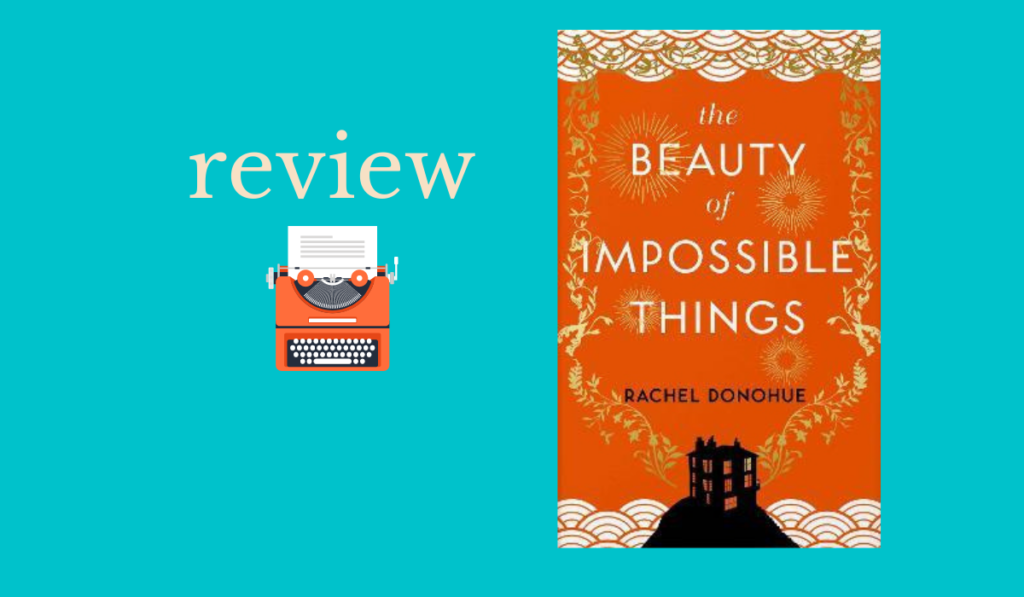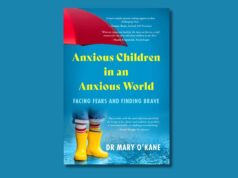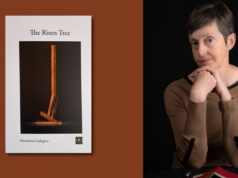
The Beauty of Impossible Things|Rachel Donohue|Corvus|ISBN: 9781786499417
by Niall McArdle
Oscar Wilde’s The Decay of Lying argues that the telling of a beautiful untruth is the ultimate aim of art.
Rachel Donohue‘s The Beauty of Impossible Things takes its title and epigraph from Wilde’s essay, specifically the idea of the blue bird “singing of beautiful and impossible things, of things that are lovely and never happen, of things that are not and should be.” It is a fitting idea for a coming-of-age novel suffused with the supernatural, for is there any time in a person’s life more turbulent and more prone to magical thinking than adolescence?
Set in a seaside town “near enough to the city to be aware of all that it was missing, and not far enough away to be considered particularly interesting” in the late 1980s during a heatwave, Donohue’s novel is the story of teenaged Natasha Rothwell and her mother, the bohemian Elizabeth, who run a bed and breakfast in a large, once glamorous house on the cliffs, and the strange occurrences that happen that summer that change everything.
Natasha has psychic abilities, a fact which only her mother and her best friend Marcus know. “I was described as unfinished and open to powers from beyond – a dark ingénue. It is the kind of thing people like to write about young women, as if we were half witch.” Strange lights appear in the sky on her fifteenth birthday, “doing silent somersaults, turning and rolling, rising to the treetops, then falling sharply … it was enthralling, like a secret fireworks show.” Are they angels or demons? Spirits to guide us or spirits to taunt?
Natasha sees them as a portent of doom, and when a local youth disappears, the town is beset by journalists and Natasha is viewed as something of a prophet. Although there are supernatural occurrences, at its heart this is the story of a girl’s relationship with her mother, and how the sheltered life they have built for themselves is interrupted by the arrival of a man into her mother’s life.
Mr Bowen, the handsome writer who’s lodging with them for the summer, enters into their lives and alters everything. “We were a puzzle to each other, he was using all the powers of his rational mind to try and work out what I was about, while I dragged the unconscious looking for signs and symbols as to the meaning of him. I lay awake in my narrow bed wondering why they had to meet and what it meant, my belief in a determined world ensuring I never saw anything as random.”
A single mother, Elizabeth is already regarded by the town as public property: “It was a different time, and she had failed a test of respectability, and her very presence stimulated thought and comment as a result, but because she was so beautiful and the family had once been important they could not discard her completely. Instead they watched her closely and their gaze became a kind of prison, her beauty and her perceived moral failures a magnet to all kinds of judgement.”
It is a different time indeed, and the events of that summer are being related to us by the now adult Natasha. There is no mention of moving statues, but Donohue surely has them in mind when describing the media circus that descends on an Irish town in the 1980s to report on a teenaged girl’s visions and predictions of death.
It’s not death, though, that Natasha really fears: it’s change. She’s in love with Marcus but he’s found a new crowd to hang out with, and the easy intimacy of their childhood friendship has gone. “There was a boredom to our conversations that hadn’t been there before, and also a sense that he couldn’t talk freely, a part of him held back.”
Their conversations are awkward; indeed, much of the dialogue has an odd, stilted quality, devoid of colloquialism and slang. Do teenagers really have conversations like this?:
‘There really isn’t any point in being frightened,’ I said. ‘When something is bigger than you, or more powerful, you just have to accept it.’
‘You must be particularly calm. I would like to be but never am, it’s annoying,’ she said.
‘People always think they can control things, like I feel it when they talk, they are always fighting something, and maybe they should just give in.’
‘You can see into people’s heads?’
‘Not exactly, but I sense what they are feeling.’
‘That is like a superpower. So you know when someone is lying?’ she asked.
‘No, I just might feel wary of them.’
They still act like teenagers, of course, and Donohue is very good on the slights, betrayals and misunderstandings that mark adolescence. There is an air of melancholy that hangs over everything, not just a sense of foreboding, but a feeling of something lost, and Donohue’s prose is at times precise to the point of being clinical, at times lyrical and vivid.
The novel’s framing device – the now-adult Natasha is encouraged by her therapist “to go back to that hot summer and find myself again.” – means unearthing long-buried feelings. The Beauty of Impossible Things is that rarest of things; a coming-of-age novel for grown-ups. It is a book about first love, growing up and growing wise, secrets and betrayal, and the severe hold that the past has on us.












